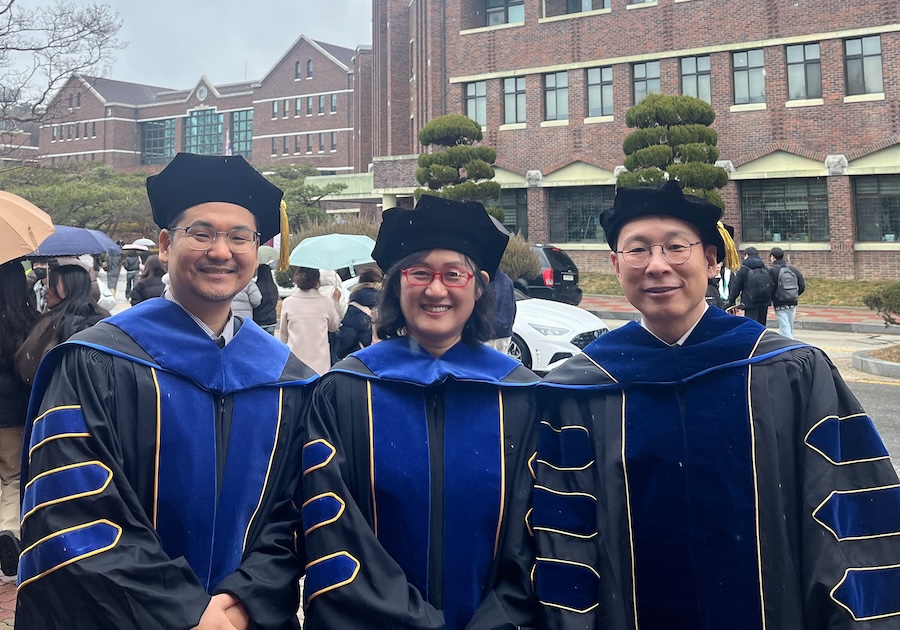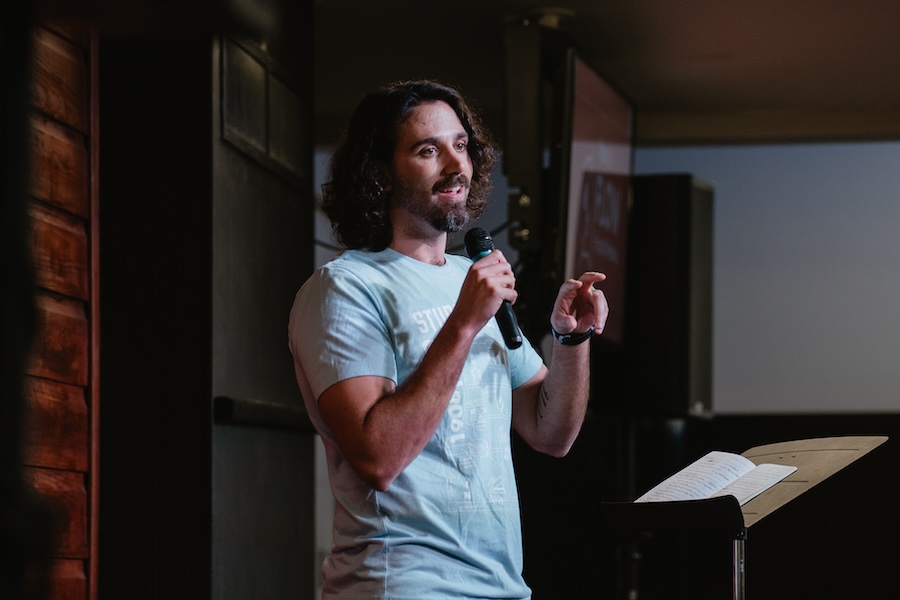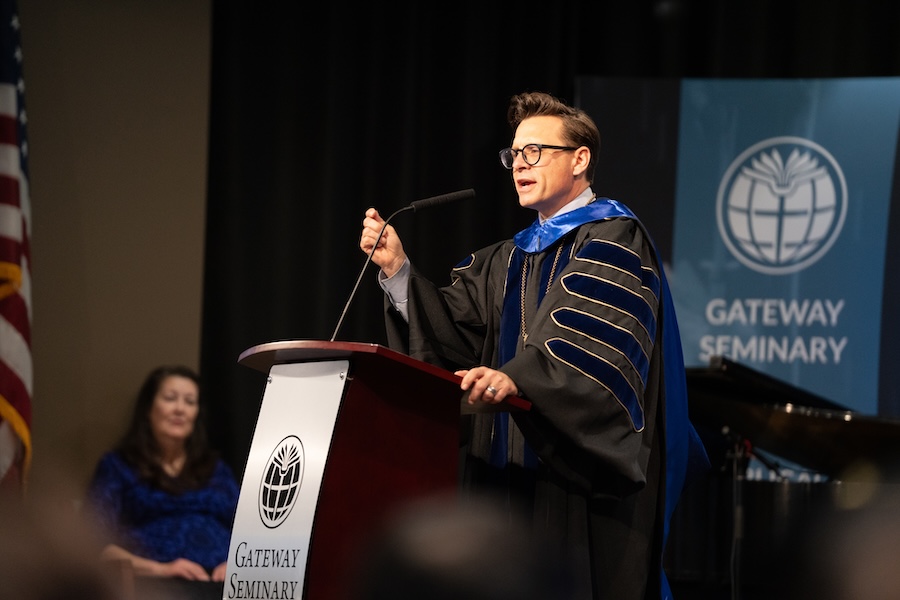Spreading the Gospel to the Nations: Andrew Bristol follows the Lord in obedience around the world

Editor’s note: This article originally appeared in the Spring 2023 issue of Southwestern News.
When talking to Andrew Bristol (’93, ’99)*, one would never know the native Texan has spent the past 20 years living overseas, immersed in international culture and can speak Farsi fluently. Andrew believes that teaching leaders how to read and teach the Bible is the “paradigm for ministry” and he uses this framework as he seeks to spread the Good News across the world as he serves through the International Mission Board.
“At the end of the day, I’m called to be a Bible teacher,” he says, and Southwestern Baptist Theological Seminary is the place where he learned how to do that.
Andrew’s degrees from Southwestern have been the fuel he needed to travel and serve the Lord wherever opportunities have been made available. He has called several different countries home and lets neither diverse languages spoken nor changes in culture deter him from clearly painting the Bible in a vivid way for his students to understand.
Andrew grew up in Irving, Texas, where he was a member of Plymouth Park Baptist Church. He credits the “regular church attendance” providing him the opportunity to “build peer relationships centered on faith,” which was “helpful” to him as he “tried to live out” his “faith well in middle school and high school.” His youth minister, Don Guthrie (’79), “made quite an investment into me and others who indicated interest in vocational ministry,” he says.
After graduation from MacArthur High School in Irving, he attended Hardin-Simmons University in Abilene, Texas, where he majored in biblical studies. It was there, in the midst of Greek fraternity and sorority life, that Andrew met Josie*. After their first date, they only had eyes for each other and were married in December 1986.
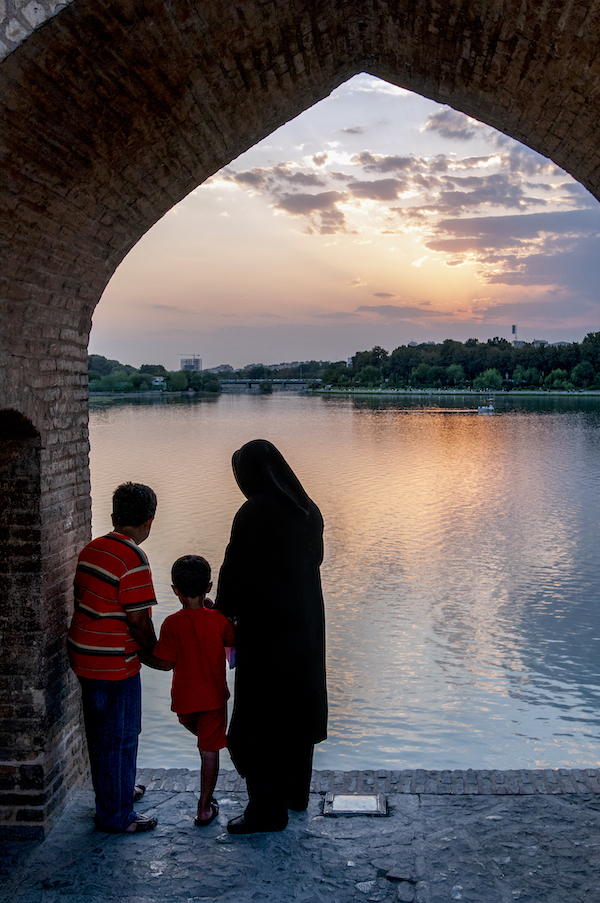
Andrew Bristol*, a two-time graduate of Southwestern Seminary, serves through the International Mission Board (IMB) as a Bible teacher.
As a Texan, Andrew made Southwestern Baptist Theological Seminary his choice for theological education. “Since I am from the DFW area, Southwestern was coming back to a place that I knew and where I would have family,” he says.
Andrew, who earned a Master of Divinity in 1993 and a Doctor of Ministry in 1999, loves Southwestern. He says his “ministry ambition was the pulpit” and academic studies at Southwestern “reflected that,” adding that he “chose Bible and preaching classes as much as possible and that has served me well, especially as I train nationals” in the role God ultimately had for him as a global missionary.
One of his doctoral seminars in missions “fanned the flame” even further towards missions, Andrew recalls. He remembers that one of the books assigned to him to read was Let the Nations Be Glad, by John Piper, which had a “big impact” on him regarding missions. A classmate in a doctoral seminar, who was also a missionary, also had a significant impact on Andrew’s call to missions. “He regularly advocated for advancing the Gospel cross-culturally. His passion was displayed with tears. He was passionate about shifting resources from the United States to the unreached places. His attitude towards missions made me evaluate my own ministry trajectory,” recalls Andrew.
Andrew remembers the late David Garland, distinguished professor emeritus of Old Testament, and his teaching of the book of Isaiah, “specifically how to see Christ in the Bible,” as being influential during his time as a student. “I remember being moved by his presentation of Isaiah 6,” Andrew says, adding the way Garland taught the chapter “was so powerful I cried. He had a certain passion that came out differently.” He also remembers James Heflin (’68, ‘74), professor of preaching and pastoral ministry, who “gave more gravity to the ministry of preaching” and G. Lacoste Munn (’55, ’59), retired professor of New Testament, who was his Greek professor whom he describes as “awesome.”
Andrew recalls the depth of this appreciation for his Southwestern training not being realized until he was in the ministry work much later as he observes, “I really have appreciated it over the last 20 years, being able to look back and see how important it was. The institutional part of my education really has played a role in shaping how I approach the work.” He says the teachers he had were “wonderful” and “instilled in me that kind of passion for Bible first in ministry.”

Through a class at Southwestern Seminary, coupled with a mission trip at the invitation of his pastor, the Lord called Andrew and his wife, Josie*, to serve on the mission field.
Andrew’s first job as a pastor upon graduation from Southwestern was at a church in the “small, cotton community” of Haskell, Texas, where he preached the Word faithfully for almost ten years. After that, he worked in a variety of ministry roles such as youth and recreation pastor, college pastor, and lead pastor, culminating in 20 years of working at churches in Texas before becoming a missionary with the IMB.
While pastoring a church in West Texas, Andrew and Josie went on a mission trip to Romania, which sparked their call to missions. Andrew remembers the “spiritual interest and conversations” in Romania as being “so different.” He saw that “there was much more openness, and the needs were much more apparent. There was also a sense in which you come away and say, ‘We could do this!’ Mission trips make the mission enterprise accessible,” Andrew says.
After returning from the mission trip to Romania, Andrew and Josie were wrestling with the decision to go on the mission field or accept an invitation to join another church staff. He remembers “it was a real watershed moment for us because it was, ‘Are you going to go kind of the route that I wanted to all my life’ and doors were opening for me to do pulpit ministry or would I do missions?” It was “difficult” for the Bristols to come to an agreement and decide, but eventually they decided to become missionaries with the IMB.
Andrew and Josie’s missionary journey overseas began at the invitation of their then-pastor, Glenn Watson (’86, ’93), of Hurst Baptist Church in Hurst, Texas, to visit the Lisbon Theological Seminary in Portugal. However, due to unforeseen circumstances, they were diverted and ended up joining a team to help with Persian people. Josie’s experience as a professional marriage and family therapist and Andrew’s theological education were a perfect match for the needs of working with the Persian people. Their professional backgrounds and expertise were helpful and so they went where they were needed. Josie worked in IMB member care for several years until five years ago when she transitioned to working alongside Andrew, spending time with ladies, ministering, giving care to their team members, and conducting marriage and family training for Persians.
The Bristols’ missionary journey has taken them to many different places such as the Middle East and Europe. Andrew began his current position in 2017, leading theological education among Central Asians and Middle Easterners from around the world including refugees and settlers. His team covers a wide geographical range including Europe, the Middle East, Asia, South America, and Canada.
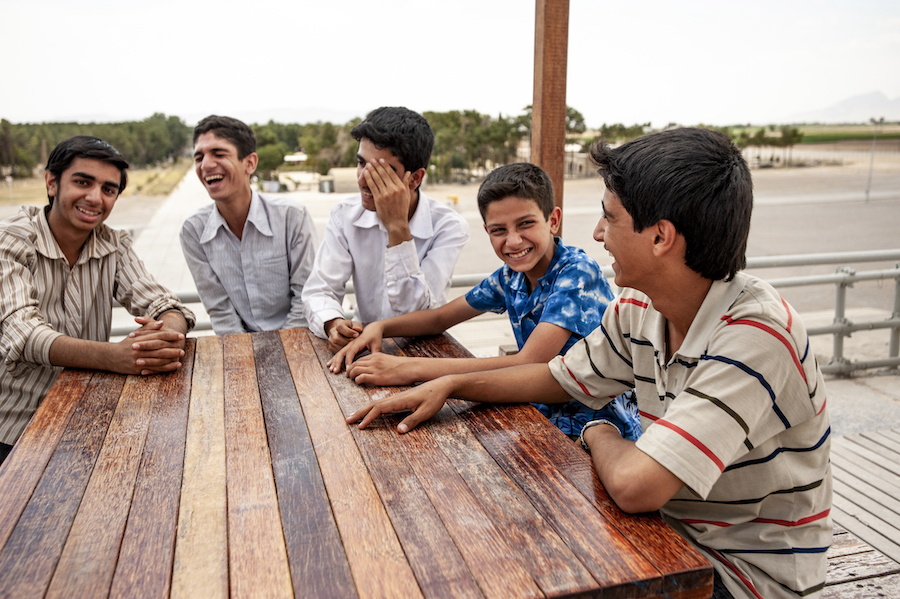
Andrew began serving in his current position with the IMB in 2017 spearheading theological education among Central Asians and Middle Easterners.
Andrew’s specific focus is Bible teaching, both online and in-person. He helps lead a theological seminary for Persian speakers which he helped create through a partnership with Southeastern Baptist Theological Seminary in Wake Forest, North Carolina.
“At the end of the day, I’m called to be a Bible teacher. That’s our paradigm for ministry. If you want to teach church leaders, teach them how to read the Bible well and then help them teach the Bible to their people,” Andrew explains. The topics of his teaching include expository Bible teaching, biblical hermeneutics, and ecclesiology. “We have to be able to know how the Bible works, to know how the church works, and [to] know how the Gospel is the fruit of those things,” he says.
Of the three Persian languages, Andrew primarily speaks Farsi. When working with refugees, his team implements a variety of activities to reach out to people in the community and have spiritual conversations. Often his team will “rent spaces near the refugee centers” and they “set up a tent” and provide a variety of things for the refugees such as refreshments, haircuts, or Vacation Bible School events.
The “settled Persians are pretty hungry for the Gospel and are open. For us, ministry looks like an investment into Persian leaders. We have a lot of Persian work that’s at the training, theological level helping leaders develop so that they can lead their people well in a community of faith,” Andrew explains.
In December 2022, the Bristols arrived in Texas to begin a stateside assignment. While there, Andrew and Josie will continue to work, but in different ways. While Andrew will still be able to continue teaching his classes online and communicating with students, he and his wife will also spend time across the state representing the IMB.
Due to the changing landscape of American demographics and recognizing that “the world is changing” with “even small cities having a lot of international access,” he urges students and pastors to understand that “the local church must have a cross-cultural element.” Andrew encourages leaders to ask themselves, “How does my church engage cross-culturally?” His advice for current Southwestern students in pastoral ministry is to “consider how local cross-cultural ministry can add value to fulfilling their Great Commission mandate. For the local church to have generational influence, it needs to add a strong cross-cultural element.” Andrew sees the “dramatic shift in human populations into the United States” as an opportunity to “open doors for church growth.”
Throughout Andrew’s work, he clings to the Word of God as life support and his most cherished Bible verse, Ephesians 1:3, as an anchor for his soul.
“This verse fights my never-ending struggle to find some measure of sufficiency within myself to secure God’s favor,” Andrew concludes. “It is a call to look to Christ for all that satisfies and increases my faith. It reminds me to make Christ the object of my confidence and comforts me, especially as I get older, and my deficiencies are more evident.”
Elizabeth Bennett is a news writer for Southwestern News.
Photos for this article were provided by the International Mission Board.
*Names changed for security reasons.
